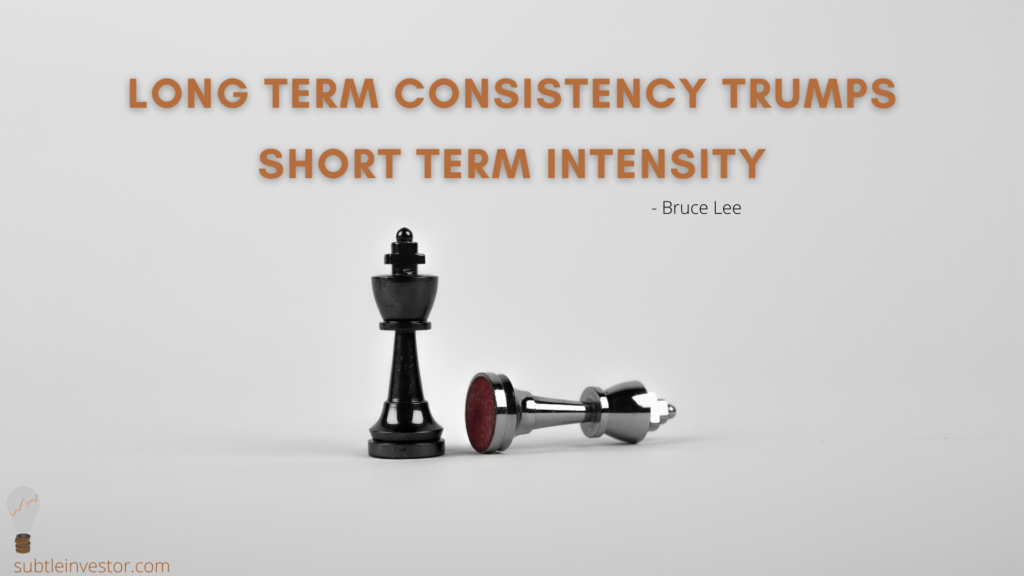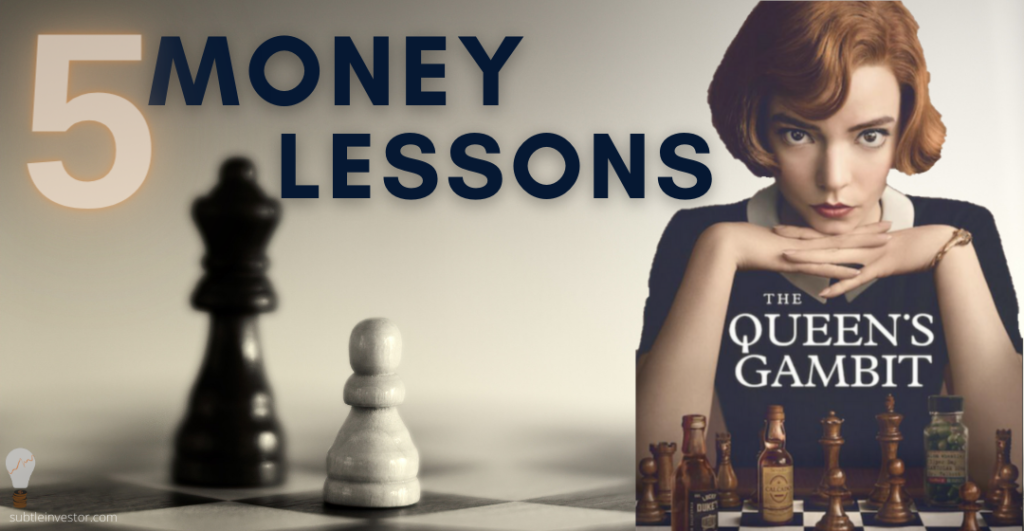5 Money Lessons I learnt from Netflix show The Queen’s Gambit
Call me a geek, but I cannot help but draw analogies from everything that I watch and read to financial experiences. The same happened when I finished watching Netflix series The Queen’s Gambit. Here are 5 money lessons that I took away from this series. This may contain spoilers!
One: Focus on what you know
You may have heard the phrase “Jack of all trades, master of none”. It is a figure of speech used to describe someone who attempts to know a little about a lot of things. While this approach may work in few instances, but the series Queen’s Gambit showed that the opposite of this may just be life’s best strategy. The main character of the series, Beth Harmon, an orphan kid with nothing really going for her, follows her curiosity in the game of chess. She grows up in an orphanage with minimal social skills and lack of interest in academia. Rather than socialising she chooses to devote her time learning chess. She spends prolonged hours in her orphanage basement, playing chess with the building’s caretaker Mr. Shaibel. Her authentic curiosity and devotion to chess begin to pay off very quickly. Since she only focusses on what she knows, which is chess, she finds exponential growth in this niche. In a truly short span of time, she starts winning against the country’s greatest chess players and becomes an international sensation.
The strategy of focussing on a niche that we know very well can be applied to our approach in investing and money management. While investing is for all, we are not all required to “know it all” about the world of investing. Investing our money can extent to anything from stocks, funds, real estate, and bitcoins. And it is nearly impossible to focus on all of these areas at once.
Therefore, my first learnt money lesson from watching The Queen’s Gambit is to spend time and learn a lot about few stocks & investments than trying to know very little about a lot. For example, if we focus on investing money in companies that we researched extensively, we can start to minimize potential risks with those investments, and hopefully see that exponential growth as well.

Two: Never stop learning. Overconfidence can be self-defeating
Throughout the series we saw Beth Harmon consistently reading books about chess. Although she was getting close to becoming a chess master, she did not stop educating herself. The series also highlighted that when she exerted overconfidence in her own skills, it only bought setbacks to her career. She ultimately conquered her initial defeat with the Soviet-Russian world champion Borgov by continuing to study about chess through intensive reading and learning from her peers.
And so, my second money lesson is to never stop learning. It does not matter how financially literate you become, there is always more to learn. I personally feel that the more I learn, the more I fear not knowing enough. This is a good thing, I feel. Overconfidence can be destructive. This is one of the reasons why I started to blog and make educational videos about investing and personal finance. Every time I create a new content, I learn something new.

Three: Looking rich does not make you wealthy
Maybe it is in our human nature to associate “rich” looking people as being wealthy, successful and happy. In reality, you can look rich but still be broke. This was effortlessly portrayed in The Queen’s Gambit. The series showed Beth Harmon’s obsession with fancy dresses. The fascination developed over time. The more she started to pocket tournament profits, the more she began to splurge her earnings in expensive clothes and lifestyle. The series effectively showed her little interest in understanding finances and importance of building wealth. Even after winning first prize in all her tournaments, she still ran out of money just before setting off to Moscow for her life’s biggest game. It was clearly one of the lowest points in her career as she had to request money from people around her.
Therefore, the third money lesson is understanding the importance of building wealth and maintain solvency. Beth’s winning profits are similar to our contractual wages. At some point they will end as we stop exchanging our labour for money. This is why it is extremely important that we make a sound financial plan for our future. Budgeting our expenditures against income and keeping an emergency fund is especially important. The series also reminded me that financial show-off can be self-destructive. You may find my post on why successful people focus on growing wealth and not income a relevant read on this topic.

Four: Take recommendations from others, but follow your own instinct
Closer to the final tournament with Borgov, Beth was taking extra preparations. As well as studying Borgov’s chess strategies she willingly took help from her peers. Her other chess playing friends harmonised multiple winning strategies that she can apply during the final game with Borgov. She was taking their recommendations. However, during the tournament Borgov played rather unexpectedly towards the end which diluted all of Beth’s learned recommendations. At that nail biting crossroad, she had nothing else to fall back on but to follow her own judgement. So, she followed her instincts and made the right move.
And so, my fourth money lesson is quite simple: follow your own reasonings. In money & investing, we are never short of “money gurus”. Everyone seems to have something better to advise on someone else’s finance. While it is a good practice to learn from others and listen to their recommendations, at the end of the day we should make our own choices. We should own our decisions. This is especially applicable to investing money in the stock market. Some stocks might be perfect for other’s while it may not be unsuitable for us. The same is true for paying down debt or mortgages early. Just because an early payment of mortgage is a financial priority for someone, does not mean it is the optimal choice for us. We alone understand our financial situations and preferences better; therefore, we should not base our actions solely on other’s recommendations.
Five: Overcome short-term pleasures to focus on long term Success
The series depicts that from an early age Beth develops an addiction to “green pills”. It starts off as a harmless pleasure, but it does not take long for that little indulgence to quickly become a central part of her life. While remaining addicted to the green tranquillity pills, Beth quickly turns to compulsive drinking. We hear her say, “What I need is the pills. The booze. I need my mind cloudy to win. I can’t visualize the games without them”. While the pills and liquor were giving her short-term pleasures it eventually had an adverse effect on her life. Closer to the climax, she was finding it difficult to stay sober and was awfully close to not attending her final big tournament with Borgov, in Russia.
Therefore, my final key takeaway from The Queen’s Gambit is knowing the importance of overcoming short term pleasures that has the potential to turn into something harmful in the future. We can draw parallel to Beth’s addiction to the pills to our pleasure of splurging credit cards to buy things we do not need. Shopping addiction or compulsive buying is a real psychological challenge. Realising its early signs and identifying them can prevent it from progressing into something serious. Excessive gambling can also be seen under the same light. The worst-case scenario would be if we feel the need to keep on using credit cards and taking out unnecessary loans only to fulfil some of these short-term cravings. A high level of debt can easily creep into a looming dark cloud, overshadowing everything good that we are trying to achieve financially. Therefore, we should not only just look at what we are doing right (such as winning tournaments for Beth); but also pay attention to aspects of our lives that may be holding us back (such as addiction).

The summary
Look around, there are money lessons everywhere. Although, I did not find the show all that “amazing” but I sure took away many money lessons which I can apply in my own life.
- Learning is a never ending process. Even the experts need to keep themselves up to date
- We should only put our money in investments that we know and have studied. Therefore, the need to increase financial literacy is paramount
- Looking rich does not make you wealthy. Real wealth comes from building assets that can grow and generate passive income overtime
- Learning and taking recommendations from others is important, but in the end we only have ourselves to rely on, and so self study is again very important
- Sometimes it is better to sacrifice some of our short term pleasures to focus on achieving our one big long term goal

